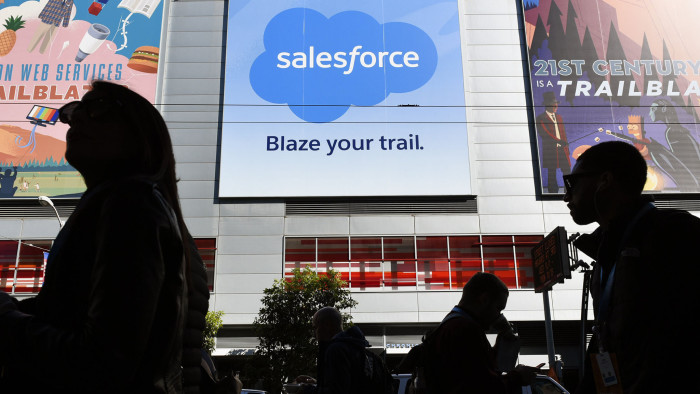Salesforce expands Chinese presence by partnering with Alibaba

Roula Khalaf, Editor of the FT, selects her favourite stories in this weekly newsletter.
US cloud software company Salesforce has partnered with Chinese technology giant Alibaba as it seeks to gain a larger piece of China’s booming $12bn cloud computing industry.
The tie-up is a validation of Alibaba’s leadership in cloud services, particularly in China, and a key example of the ecommerce company’s sharpening focus on the business side of its internet ecosystem and international growth.
Under the terms of the deal, “Alibaba will become the exclusive provider of Salesforce to customers in mainland China, Hong Kong, Macau, and Taiwan, and Salesforce will become the exclusive enterprise customer relationship management (CRM) product suite sold by Alibaba,” Salesforce said in a blog post.
Cloud services have become big business as companies accelerate moves to the cloud globally. Salesforce has pioneered the use of CRM, which uses software to analyse sales and drive top-line growth.
The alliance with Alibaba means Salesforce has an instant head start in terms of feet on the ground to pursue sales in China. The country requires foreign groups to work with a domestic company in processing and storing data from Chinese users.
Alibaba, meanwhile, can now provide this service to the numerous businesses selling through its ecommerce platforms.
Total spending on public and private cloud infrastructure in China reached $12bn in 2018, up nearly 75 per cent year on year, and accounted for 12 per cent of the global market, according to IDC, a market research provider.
That is set to increase as Chinese companies become more sophisticated in using cloud technology and data to provide services to customers as well as for their back office needs, such as human resources, said Jerry Liu, head of Hong Kong and China internet research for UBS.
“China is getting closer to an inflection point in the adoption of software as a service (SaaS) by businesses,” Mr Liu said.
The partnership comes as a number of the company’s main competitors blame US-China tensions for denting software sales in Asia. SAP, Europe’s largest software company, blamed the trade war for its disappointing second-quarter profits this month.
Oracle, which Salesforce competes with in providing business software to companies, made 900 employees from its China team redundant in May, with some staff blaming tensions between the US and China for the cuts.
Salesforce, which has market capitalisation of $124bn, previously had a limited presence in China but said on Wednesday “more and more of our multinational customers are asking us to support them wherever they do business around the world”.
Alibaba’s cloud business was ranked number three in the global cloud market and number one in China’s public cloud market in 2018, according to reports from Gartner and IDC. Tencent is also pouring millions of dollars into its own cloud arm as it seeks to catch up with its rival.
“Generally we see that Alibaba and Tencent are increasing their focus and investments in cloud,” Mr Liu said.
“This is a platform business so [it] will need a lot of partners to get on board. Tencent previously invested in Weimob and Youzan. And Alibaba moved the DingTalk business into the cloud unit. I’m sure there will be more.”
Alibaba, which has grown to a market capitalisation of $450bn-plus and last year generated revenues of $56bn, last month unveiled a succession plan that saw Maggie Wu, chief financial officer, take on strategic investments.
The Chinese company opened its business-to-business online marketplace to sellers in the US this week in a direct challenge to US ecommerce player Amazon, as it attempts to expand internationally.
Comments